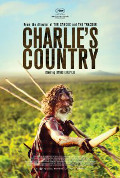
Directed by
Rolf de Heer
117 minutes
Rated M
Reviewed by
Chris Thompson

Charlie's Country
Synopsis: Charlie’s getting on in years and his health is not the best. He lives in a humpy in a remote outback town in the Northern Territory where the combination of the government’s intervention and the way the local police treat the indigenous community is increasingly frustrating for him and his mates. In protest, Charlie goes bush to live a more traditional life, but his declining health winds up landing him in a Darwin hospital. From there things go downhill until he eventually finds himself back where he started. But this time, perhaps he’s a bit wiser for the journey he’s been on.
The creative partnership between writer/director Rolf de Heer and actor David Gulpilil has previously produced The Tracker in 2002 and in 2005 Ten Canoes which took out the Un Certain Regard Special Jury Prize at Cannes. For Charlie’s County, they combine their skills to co-write this film about the displacement and disenfranchisement of Aboriginal people in the community at Ramingining in Arnhem Land since the government intervention has taken control of their money and, supposedly, their consumption of alcohol.
It’s a tough subject that they’re dealing with here but despite that de Heer and Gulpilil manage to find a lot of humour to balance out their portrayal of a way of life that is eroding the heritage of the land’s traditional owners. Some of the funniest and most touching moments in the film happen between Charlie and his old mate, Black Pete, played by Peter Djigirr. The scene where the two of them head into the bush to hunt a buffalo, the action for which mostly happens off-screen, is hilarious (though how they could have got that buffulo on the bonnet of hteir car is another matter). Their laughter at the absurdity of much of what goes on around them is infectious, even if what they are laughing at arises from their despair at the incompatibility of white law and black culture. But the prevalence of smokes and dope and grog and ‘whitefella’ junk food is taking its toll and, despite these moments of joy, the situation for Charlie is bleak and depressing.
It’s not surprising that David Gulpilil received the award for Best Actor – Un Certain Regard at Cannes this year. It’s a gentle, deeply felt and studied performance that is at its best when through the close-up lens of Ian Jones’ camera we are left to read into his face and his body language all the internalised emotion that is welling up inside the character.
Unfortunately, the subtlety of Gulpilil’s performance isn’t always matched by the rest of the film which, particularly in the latter stages often feels bluntly didactic in its delivery of what are unquestionably issues of great importance for a country still struggling with the idea of reconciliation. Many of the white characters who are, unsurprisingly, mostly authority figures, present as two dimensional buffoons and, whilst this may be the case for some, it makes the argument for Charlie’s case too easy. Greater complexity might have made the key events of the story less predictable.
Nevertheless, there is still much to recommend this film beyond the outstanding performance of Gulpilil and the strength of the performances by those around him. Not least is that in its final moments, despite the inevitability of the ending, we are given some hope for Charlie and through him see a chance for the next generation of indigenous Australains.

Want more about this film?


Want something different?




